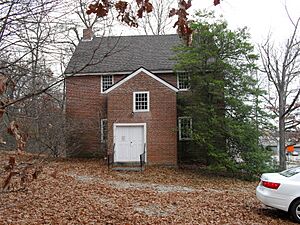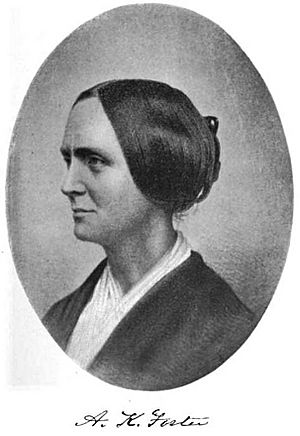Nathan Webb (minister) facts for kids
Quick facts for kids
Nathan Webb
|
|
|---|---|
| Born | April 9, 1705 |
| Died | March 17, 1772 (aged 66) |
| Occupation | Pastor, First New Congregational Church in the Great Awakening period |
| Spouse(s) | Ruth Adams of Braintree |
| Children | One daughter, Elizabeth Webb |
| Parent(s) | Benjamin Webb and Susanna Ballentine |
Nathan Webb (April 9, 1705 – March 17, 1772) was an important early American minister. He led a Congregational Church during a time of great religious change.
Contents
Early Life and Family
Nathan Webb was born in Braintree, which is in Norfolk County, Massachusetts. His parents were Benjamin Webb and Susanna Ballentine.
He married Ruth Adams in Braintree on November 23, 1731. Interestingly, his nephew later became John Adams, who was the second President of the United States. John Adams even wrote in his diary about visiting his uncle Nathan Webb in Uxbridge in March 1756.
A Long Career in the Church
Nathan Webb became the very first minister of the new Congregational Church in the recently formed town of Uxbridge. This town was officially created in 1727. The Uxbridge church had separated from the church in Mendon. Webb was asked to lead the church on January 6, 1731. This church was the first one built in the new town of Uxbridge.

Webb was officially made a minister at the Uxbridge First Congregational Church on February 3, 1731. At that time, Uxbridge was part of Suffolk County. The Uxbridge church was one of the first of 45 new Congregational churches that started in New England around 1731. These churches were part of a big religious movement called the Great Awakening. This movement began in the Connecticut River Valley and was led by ministers like Jonathan Edwards.
Soon after Webb became a minister, the town of Uxbridge became part of the new Worcester County.
Important Church Members
Many important people were part of Nathan Webb's church. These included:
- Lydia Taft: She was the first woman in America to vote.
- Lt. Col. Seth Read: He fought in the Battle of Bunker Hill during the American Revolution. He also helped add the phrase "E Pluribus Unum" (meaning "Out of many, one") to U.S. coins. He later founded Erie, Pennsylvania.
- The Taft family: Many members of this important early American family belonged to Webb's church. A later member, Alfonso Taft, started a branch of the family in Ohio that became very important in American politics.
- Deacon John Hall and Sarah: Their son, Baxter Hall, was a drummer in the first military gatherings of the American Revolution.
Mentoring Future Leaders
Nathan Webb also mentored a young man named Samuel Spring. Spring was born in 1746 and later became a chaplain during the Revolutionary War. After Webb's death, Spring served in the Siege of Boston and the Invasion of Canada (1775). Samuel Spring later started the Massachusetts Missionary Society and the Andover Theological Seminary. He wrote many sermons and was known as a strong follower of Congregational beliefs. He trained with Webb and later at the Princeton Theological Seminary.
Nathan Webb spent his entire career, over 41 years, serving as a minister in Uxbridge. His time as minister was the longest for this church. Early town histories show how important he and his church were to this new pioneer community. His ministry lasted through the years leading up to the American Revolutionary War in the Province of Massachusetts Bay.
Death and Legacy
Nathan Webb continued to serve the church in Uxbridge until he died there at the age of 66. The history books say he "continued in the faithful service of the Master" until his death.
In his will, he left money to the church. He wanted them to buy three silver cups engraved with the names Nathan Webb, Ruth Webb, and Elizabeth Webb. He also left money to be invested forever to support the learned and religious Congregational ministers of the church.
His funeral was held on April 19, 1772. This was exactly three years before the famous Battles of Lexington and Concord, which started the American Revolution.
The location of the Congregational Church later changed in the 1830s. This happened because of a split with the more liberal Unitarian Church.
Quakers in Uxbridge

Three years before Webb's death, Rhode Island Quakers built a meetinghouse on the edge of Uxbridge. These Quakers had connections to Moses Brown, a famous abolitionist. Quakers and Congregationalists lived peacefully together in Uxbridge. Both groups supported the abolition movement, which worked to end slavery. It is important to note that Rev. Webb and Deacon Read owned slaves around 1754. This Quaker meeting was one of the first in Massachusetts after Quakers had been expelled by Puritans (who later became known as Congregationalists) in the 1600s.
Later, a strong abolitionist named Abby Kelley Foster and her family were members of the Friends Meetinghouse in Uxbridge. She inspired Lucy Stone and Susan B. Anthony to join the abolition movement. Many houses in Uxbridge later became part of the Underground Railroad, a secret network that helped enslaved people escape to freedom.
Important Quakers in early Uxbridge included Richard Mowry, Abby Kelley, and Effingham Capron. These quiet Quakers, who lived their faith every day, worked alongside the descendants of the strict Puritans (Congregationalists). Together, they helped lead major social reforms and industries in the new nation.
Concerns for women's rights and human rights were important parts of the early religious traditions in Uxbridge. The American hymn writer Lowell Mason later visited Uxbridge and wrote the famous hymn tune "Uxbridge." This was one of 1,600 hymns he composed. It seems that Nathan Webb's ministry helped start a lasting religious impact in this part of the Blackstone Valley.
Significance in American History
Nathan Webb was the pastor of the first new Congregational Church in Massachusetts during the Great Awakening. He served for over 41 years. Many people in his church made a big impact on America and its early freedoms.
A sermon was given after his death by Reverend Ebeneezer Chaplin. This sermon described Webb's character for future generations. The sermon was given exactly three years before the Lexington Alarm, which signaled the start of the American Revolution. Young Baxter Hall from Webb's church was a drummer in the first military gathering of the American Revolution after the Lexington Alarm.
See also
- List of people from Uxbridge, Massachusetts
 | Percy Lavon Julian |
 | Katherine Johnson |
 | George Washington Carver |
 | Annie Easley |


